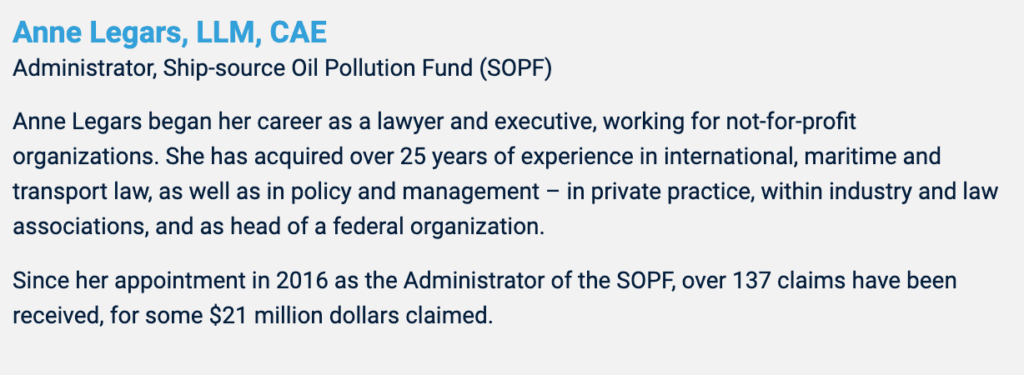
Q. What is the purpose and function of the Ship-source Oil Pollution Fund?
The Marine Liability Act stipulates that a vessel owner is strictly liable for any pollution caused by the vessel, regardless of the cause. In other words, Canada operates on the polluter pays principle. In most cases, vessel owners and their insurers will hire contractors to perform the cleanup.
The predecessor of the Ship-source Oil Pollution Fund, or SOPF, was established as the Maritime Pollution Claims Fund in 1973 as a “last resort” to pay claims for oil pollution damages. This fund was established with a levy on oil imports and exports between 1972 and 1976. This money was thereafter transferred to its successor, the SOPF, which is currently worth $409 million.
Today, the Fund has a dual purpose: facilitating access to justice for the victims of oil pollution from ship-source, and enforcing the polluter-pays principle. A ship source can be any type of vessel from a fishing vessel or cargo ship to a tour boat, or even a mystery spill where the source is unknown.
Filing a claim with the Administrator does not require a lawyer’s help, there is no adversarial hearing, delays are shorter than the court process, there is no limit to the amount that the Fund may compensate and the money is readily available.
This is the access to justice mandate, for claimants’ benefit.
However, the polluter does not escape its liability, as the Administrator becomes subrogated in the rights of the claimant once the claim has been settled and paid. The Administrator must, and does, pursue recovery of the amount paid (plus interest) against the polluter, who is generally the vessel owner, its insurer, or the person who had the use and control of the vessel at the time of the incident. This is the polluter pays principle in action.
Q. Who is eligible to file a claim with the Fund?
Any person who, in Canada, has suffered damage caused by oil pollution from a ship-source can file a claim with the Fund. A few exceptions apply.
Most claims come from institutional claimants (the Canadian Coast Guard, ports and harbours, marinas, terminals, provinces and local governments, indigenous groups) but businesses and individuals can file a claim also.
Q. What is considered a compensable damage?
Compensable damage includes any reasonable costs and expenses incurred with respect to pollution prevention and/or remediation, property damage, subsistence fishing losses (including for ceremonial use); economic losses / business losses (tourism, aquaculture, fishing industries, etc..), including related administrative or expertise costs for documenting and submitting the claim.
Some specific sectors linked to fishing and marine harvesting, including subsistence fishing, may also claim for future losses.
Of interest, in Ontario and Quebec: municipalities have filed claims and received compensation for the closure of municipal water intakes due to ship-source pollution.
Q. How does the claims process work?
The claimant should submit its claim in writing (in paper or electronic format) with supporting documentation within two years (to be safe) after the incident that caused the damage. Guidance is provided on the Fund’s website (www.sopf.gc.ca) and the secretariat is available for questions and queries.
If found eligible, the claim is assessed and an offer is sent to the claimant within (usually) two to six months. The claimant has 60 days to accept the offer. Once accepted, the payment is sent within a few days, with accrued statutory interests. The claimant who refuses the offer may appeal it before the Federal Court of Canada.
Should claimants prefer going to court against the shipowner, the Administrator is named as party by statute: if the shipowner does not pay part or all of the amount granted by the Court for oil pollution damage (because of its limit of liability or its incapacity to pay), the Fund would then cover the difference. Alternatively, the Administrator may settle the claim with the claimant and continue the court case against the shipowner in the name of the claimant.
Q: What about compensation in case of Canada-U.S. transboundary pollution?
Canada and the United States have separate regimes for liability arising from oil pollution caused by vessel. Where related damage is incurred on both sides of the border, each regime applies on its side of the border and both liabilities are cumulative for the shipowner/responsible party. The Administrator has been working with its U.S. counterpart and the other potential payers to streamline the compensation process in these situations.
